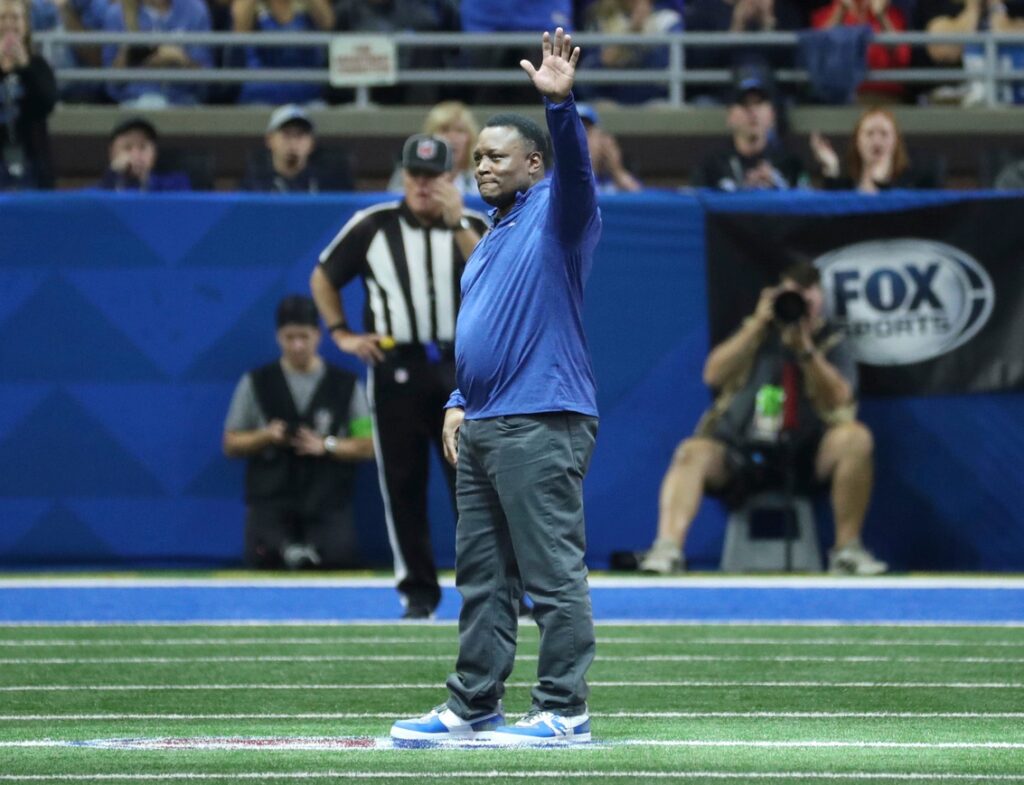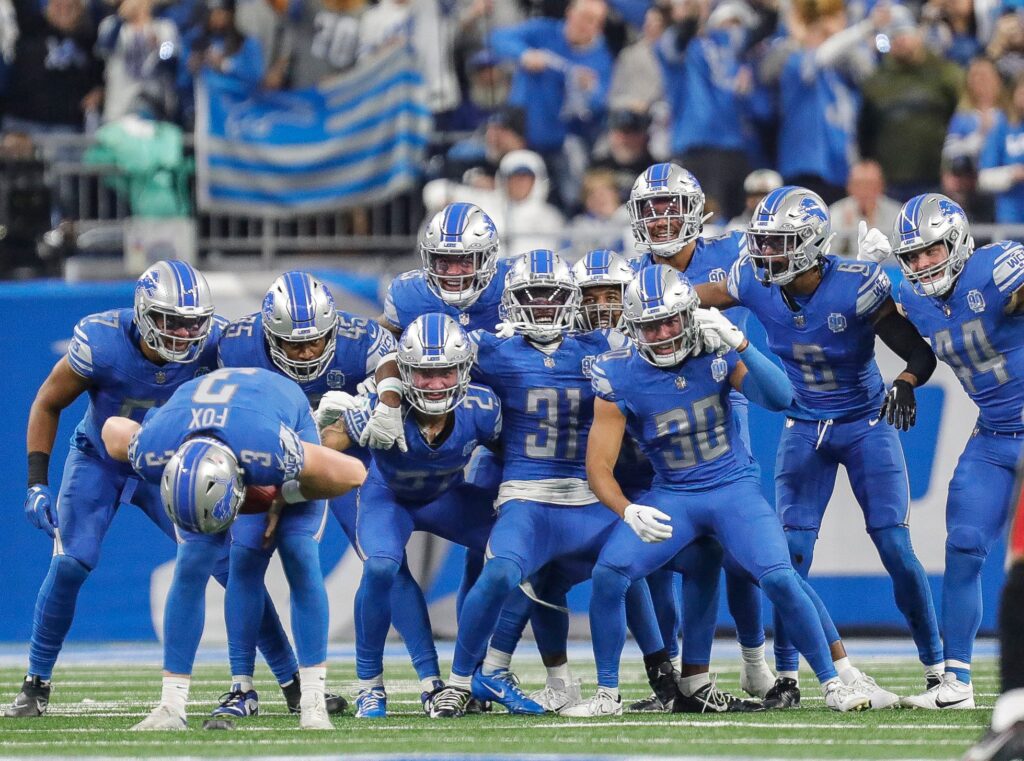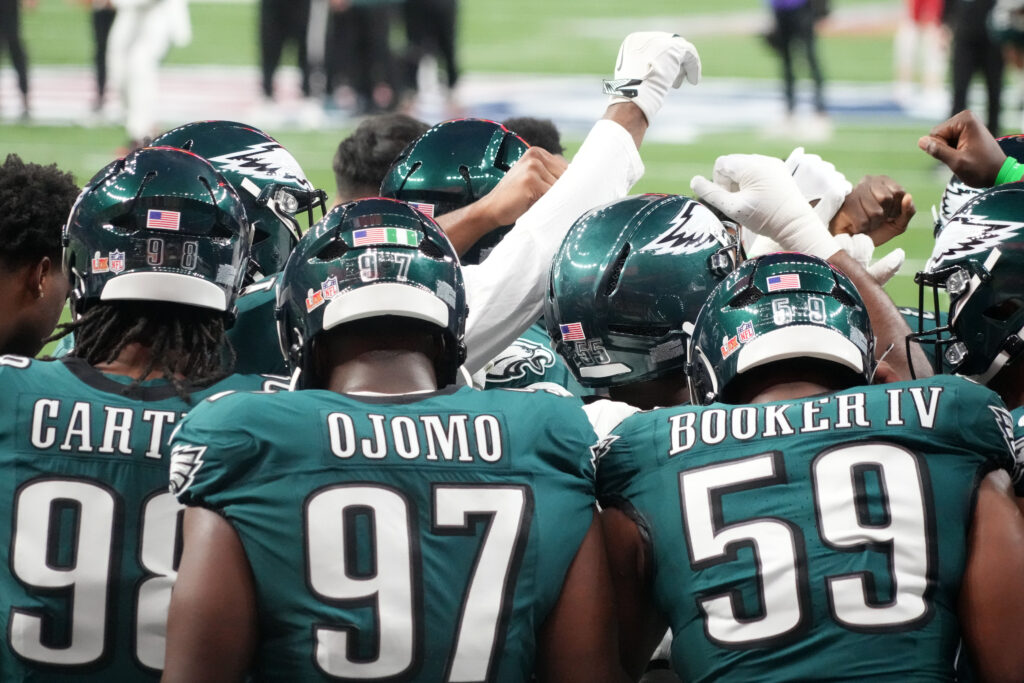Barry Sanders is known by all, not just the football community. The No. 3 pick of the 1989 NFL draft has captivated the minds of millions. The 5’8, 203-pound running back defied all odds, becoming one of the best players in the NFL during his rookie season.
In his first year with the Detroit Lions, Sanders had 1470 rushing yards, 14 rushing touchdowns, and 282 receiving yards. Throughout his ten seasons with the Lions, he had 15269 rushing yards, 99 rushing touchdowns, 2921 receiving yards, and ten receiving touchdowns. Yet, once Sanders announced his retirement from the NFL entirely, Lions and football fans alike were outraged.
Recently, the ex-NFL player released “Bye Bye Barry”, a documentary on his football career, exclusively on Amazon Prime. Here are five things you missed if you have not watched “Bye Bye Barry”.
“Bye Bye Barry”, what you missed
1. Sanders faxed his retirement to the Lions organization
On July 27, 1999, Sanders faxed his retirement statement to the Lions organization. He did not get much into detail regarding his decision to leave the game he had dominated for ten seasons.
All the No. 3 three pick had to say regarding his retirement from the Detroit Lions was, “My desire to exit the game is greater than my desire to remain in it”. Sanders does not credit his exit from the game to the lackluster season the Lions had, but he did say that maybe a few playoff games could have changed his decision.
The documentary explores how Sanders may have contemplated retiring from the game two years earlier. Two of Sanders’ teammates, Mike Utley and Reggie Brown, suffered from severe spinal injuries that would not only end their careers but also drastically change the course of their lives. Maybe the idea of what effects Sanders’s career could have on his life beyond retirement led him to leave the game for good, even if it was in the middle of his prime.
2. He was, and still is, humble amidst all of his success
The documentary did a superb job of allowing us behind the screen to see the type of man Sanders truly is. One striking moment is the clip of him being announced as the 1988 Heisman recipient. The Heisman trophy is the most prestigious honor in college football, yet Sanders controls his emotions, giving us a small smile and a thank you to his mother and father. That is it.
He carried out his life as an NFL star in this way. Unlike many of his teammates, Sanders did not enjoy the abundance of attention from the media or his fans. He wanted to play the sport he loved so much without all the extra fame and recognition . Sanders’s humble trait contributed to announcing his retirement from the NFL. A press conference would mean thousands of questions, interviews and reactions. Still, by simply faxing his statement, he avoided all of these things, leaving the organization and the people with just the few words he had to say.
3. The Lions team never felt the same after the leaders of the team were traded
Kevin Glover, a prominent leader of the Lions, profoundly impacted Sanders during their nine seasons together on the Lions. That is why the team never felt the same when Glover left the Lions in 1997 during free agency for the Seattle Seahawks.
“You go to war and go to battle with those guys,” Sanders stated. “You form a bond, obviously…some of the guys that they may have brought in to replace those guys were just not the same”.
It is evident that Sanders viewed his job as much more than simply winning games; he saw these men he stepped onto the field with daily as a family. He grew strong bonds with them, which, in turn, led to a much more successful team. Not only did they effect the teams success, but also nurtured a happy and positive environment. Sanders felt that making moves for “better” players came at the expense of the team bond. This ultimately led the lions to not having the same sense of camaraderie and closeness that Sanders loved so much about the team, inevitably leading him to retirement.
4. Sanders would not celebrate after touchdowns
One thing that is predictable in football is the touchdown celebrations. Whether it is big or small, football fans know the second the player runs or catches the ball in the end zone, a celebration is warranted.
In an interview done with ESPN, Sanders said, “I took more of a business approach”, when being asked about his absence from touchdown celebrations. Sanders simply sees a touchdown as something he is supposed to do, a part of his job; He sees no need to perform some type of celebration, although he does not judge other players for doing so. Many attribute this to Sanders’ humbleness as a player.
Sanders touches on this frequently asked question in the documentary, stating that his father was a huge contributing factor in his decision not to celebrate touchdowns.
“There was a time when I scored… and I may have done something other than just giving the ball to the ref,” Sanders said. “he just said, ‘No, you don’t gotta do that. I don’t want you doing that. I don’t want you doing anything extra’.”
Sanders’ father, William Sanders, was a large driving force in Sanders’s life and is a considerable reason Sanders has become one of the most successful players ever. If his father tells him not to do something, Sanders is probably not going to do it.
5. Sanders had an incredibly close relationship with his father
Throughout the film, Sanders’ father is featured. Whether that be through interviews with his late father or stories told, his memory carries on throughout the documentary. In the way that Sanders talks about his father, it is clear that the strong love and bond that they have for each other is still as strong as it was during his NFL career, despite his father’s passing in 2011.
The documentary included a variety of touching moments, such as his father’s acceptance of the Heisman trophy on Sanders’ behalf. It is evident from the clip that his father has an overwhelming sense of pride in his son’s talent, hard work, and discipline. The documentary also includes many funny memories of his father, like his introduction to Sanders’s induction into the Hall of Fame.“Now I want to introduce you to the third-best running back who ever lived. Barry Sanders.” The two opponents to beat out Sanders were Jim Brown and his father.
As a big Lions and Sanders fan, this movie gave insight into Sanders’s life and his decision to leave the sport he loved. Although the documentary clarifies some things many have wondered about, one question was never thoroughly answered: why did Barry Sanders retire so early from the game? The answer: “The reason I am retiring is simple: My desire to exit the game is greater than my desire to remain in it,”.
Main Image: © Kirthmon F. Dozier / USA TODAY NETWORK



